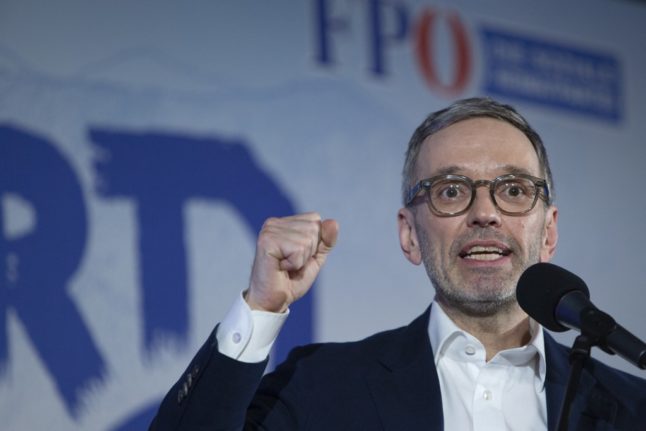The two-minute promo — which splices an extremist conspiracy theory that white Europeans are being replaced by migrants with images of Notre Dame in Paris in flames — was made by the party’s youth wing.
But the Freedom Party’s hardline leader Herbert Kickl sprang to its defence, calling the video “great”.
“I criticise the whole pseudo furore,” he said, insisting that the video, on the party’s official YouTube channel, showed “young people… with a positive approach to their homeland and nature.”
The video shows the party’s youth wing taking part in torchlight processions and standing below the Vienna balcony where Adolf Hitler gave his iconic speech when he returned to his homeland in triumph after the Nazis annexed Austria in 1938.
Austria’s conservative Chancellor Karl Nehammer led the criticism, saying the video “is meant to scare and is playing with images we know from the past”.
Sigrid Maurer, a leader of the Greens, the junior partner in the country’s ruling coalition, condemned its “Nazi imagery” and the video’s singling out of journalists as “enemies of the state”.
With the Freedom Party (FPOe) — whose founding leader was a former SS officer — high in the polls, observers say the video may signal a new radical shift in contrast to other far-right European parties that have been toning down their rhetoric to court mainstream voters.
Scandal
The party has been part of coalition governments several times, the last of which collapsed in scandal in 2019 when its then leader was filmed asking for money from a woman posing as a Russian oligarch’s niece in exchange for public contracts.
“Under former party leaders, the FPOe set itself apart” from the extreme right, political scientist Peter Filzmaier told AFP, who said the video evoked “memories of the darkest times in Austrian history and right-wing extremism.
“The video is frightening because parts of the FPOe youth wing obviously think like the extremist Identitarian movement, which is under surveillance by Austria’s domestic intelligence agency (DSN),” he added.
The video has been reported to prosecutors with the DSN also investigating, according to media reports.
Contacted by AFP, the DSN said it is “monitoring various persons and groups likely to be involved in extremist and anti-constitutional activities” but was unable to provide information about “possible investigations”.
The FPOe has seen its support soar to around 30 percent in the latest polls — up from 16 percent in 2019 — buoyed by discontent over inflation, migration and the war in Ukraine.
It is already part of coalitions ruling three Austrian provinces, with the opposition Social Democrats and the conservatives lagging behind it in national polls.
‘Brazen signals’
“The FPOe feels reassured by its lead in the polls when it comes to Kickl’s hardline course,” said researcher Bernhard Weidinger of the Documentation Centre of Austrian Resistance, which monitors neo-Nazism.
“What is new is the accumulation of open references to the extreme right — from the basic narrative… to the aesthetics,” said Weidinger.
“Hardly any other party in Europe on the verge of an election victory and possible participation in government sends out signals in such a brazen manner to the fringes of the right,” he added.
The controversial youth wing video, which went online on Sunday, blamed Europe’s politicians for “mass migration, wokeism, rainbow (LGBTQ) terror and Islamisation”.
With images of ranks of soldiers and people in traditional Alpine costumes, it presents the FPOe as “Austria’s last chance” to “resist the left-liberal indoctrination” and “turn things around”.
It also features images of fascist guru figures, including the French Nazi collaborator Pierre Drieu la Rochelle and Japanese nationalist Yukio Mishima as well as Portuguese dictator Antonio Salazar.
Austria — which the Nazis annexed in 1938 — has some of the world’s strictest laws against Holocaust denial and pro-Nazi activities.
Despite this, convictions are rare.



 Please whitelist us to continue reading.
Please whitelist us to continue reading.
Member comments